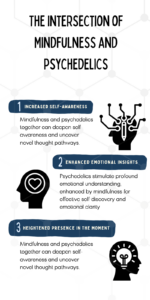
The intersection between mindfulness practices and psychedelic therapies has not significantly been explored, however, there are many ways these two disciplines work well together and can potentiate therapeutic outcomes.
What are Mindfulness practices?
Mindfulness practices are techniques that encourage individuals to maintain a moment-by-moment awareness of one’s thoughts, feelings, sensations, and surrounding environment. Rooted in Buddhist meditation principles, mindfulness has become a key element in many Western therapies due to its effectiveness in reducing stress, improving mental clarity, and enhancing emotional intelligence.
The practice typically involves a combination of concentration exercises and breathing techniques to cultivate a state of relaxation combined with an active attention.
The Science of Mindfulness
Mindfulness, with its roots in ancient Buddhist meditation, has become a significant focus of modern psychology and neuroscience. Its intersection with psychedelic therapies creates a symbiotic relationship where both practices can enhance the other’s impact.
Impact of Mindfulness on Brain Function
Research has shown that mindfulness can bring about significant changes in brain function. In particular, it affects the areas associated with memory, empathy, and stress. Mindfulness practices have been shown to increase gray matter in the hippocampus, an area crucial for memory and learning, and reduce gray matter in the amygdala, the region associated with stress and anxiety.
Benefits of Mindfulness Therapy
- Improved Mental Health: Studies have shown that mindfulness-based therapies can help reduce symptoms of depression, anxiety, and post-traumatic stress disorder.
- Enhanced Emotional Well-being: Mindfulness promotes self-awareness and emotional intelligence, leading to healthier relationships and improved emotional well-being.
- Reduced Physical Pain: It may also help manage chronic pain and reduce the severity of physical symptoms in some illnesses.
Incorporating mindfulness within psychedelic therapy can potentially enhance therapeutic outcomes. Mindfulness practices, specifically breathing techniques, can help individuals better navigate altered states of consciousness, thereby improving their ability to integrate these experiences into their daily lives and further aiding their healing process.
Psychedelic therapy overview
Psychedelic therapy is a therapeutic modality that involves the use of psychedelic substances, typically in a controlled and safe environment, to promote profound changes in consciousness. It is often used in conjunction with traditional psychotherapy techniques.
- This form of therapy has shown promise in treating a range of mental health disorders, including depression, anxiety, PTSD, and addiction.
- The substances used in psychedelic therapy, such as psilocybin, LSD, and MDMA, are administered under the guidance of trained professionals to ensure client safety and the efficacy of treatment. Many of these substances are only legal for use in the context of research.
- The experience, often characterized by altered perception and heightened introspection, can lead to significant shifts in mood, perspective, and self-awareness.
For those interested in further exploring this field or seeking to expand their professional skills, you may consider getting certified as a Psychedelic-Assisted Therapy Provider (PATP). To learn more about this certification and the training process, you can click here (https://psychiatryinstitute.com/ipi-year-long-psychedelic-assisted-therapy-training/).
The Science of Psychedelic Therapy
There are a number of aspects to consider of how psychedelic therapy works and the roles of different psychedelics in treatment.
- Psychedelics play distinct roles in therapy, each offering unique pathways for healing and self-discovery.
- Psilocybin, found in magic mushrooms, can catalyze deeply introspective experiences, often leading to shifts in perspective and self-perception.
- LSD, or Lysergic Acid Diethylamide, induces dramatic changes in sensory perception and thought patterns, which can be useful in confronting and reframing traumatic experiences.
- MDMA, or Methylenedioxymethamphetamine, boosts feelings of empathy and reduces fear, making it particularly effective in treating PTSD.
Just as mindfulness serves as a tool for grounding one’s experience in the present, psychedelic therapy can foster introspection and self-awareness. It’s essential for those in the role of psychedelic-assisted therapists to undergo significant intrapersonal development, cultivating the skills needed to facilitate these profound therapeutic experiences.
As such, we recommend this comprehensive blog by Sara Gael, MA, LPC, for an illuminating perspective on the subject.

The Intersection of Mindfulness and Psychedelics
The intersection between mindfulness and psychedelics forms an intriguing sector in the field of mental health. Mindfulness, a practice focusing on being aware of what one’s senses are experiencing without interpretation or judgment, can greatly enhance the benefits of psychedelic therapy.
Some areas where mindfulness and psychedelics intersect, include:
- Increased Self-Awareness: Mindfulness encourages heightened awareness of the self and its inner workings, as well as a more profound understanding of one’s motivations, behaviors, and emotions. Psychedelics can amplify this process with its powerful effects on mood, behavior, and thought patterns — opening up new pathways to explore and uncover.
- Enhanced Emotional Insights: Psychedelics can catalyze deep emotional insight, while mindfulness helps to process and integrate this information. Through a combination of immediacy and objectivity, an individual can gain clarity into one’s emotions and why they exist — paving the way for more meaningful self-discovery.
- Heightened Presence in the Moment: Mindfulness is a practice of being present in the moment, while psychedelics can often reveal many new discoveries of what an individual can be present to. Through this combination, individuals can gain a better capacity to understand their inner world and how it relates to external influences — leading to healthier relationships with self and others.
Can Psychedelics and Mindfulness Replace Traditional Mental Health Therapies?
While it is unlikely that mindfulness and psychedelics will outright replace traditional mental health therapies, their integration offers a promising avenue for refining and enhancing existing treatment modalities. The intersection of mindfulness and psychedelics can introduce new dimensions to therapy, broadening its scope and increasing its effectiveness.
Psychedelics, when combined with mindfulness techniques, can support traditional therapies by offering a deeper level of introspection and self-awareness. They can facilitate breakthroughs in thought patterns and emotional blockages that might be resistant to conventional methods. Mindfulness can augment the therapeutic effects of psychedelics, assisting in navigating the psychedelic experience and integrating insights post-session.
By focusing on the individual’s overall well-being and relationship with their inner selves, it encourages a shift from solely treating symptoms to addressing the root causes of mental health issues.
Examples Where Mindfulness Practices and Psychedelic Therapy Work Well Together
- Psychedelic-Induced Anxiety and Fear: The intensity of a psychedelic experience can trigger overwhelming feelings of anxiety and fear.Solution: Incorporating mindfulness exercises during the therapy can aid in managing these emotions. Regular practice of mindfulness, even outside of therapy sessions, can help individuals better navigate intense experiences.
- Unresolved Trauma Resurfacing: Psychedelics have the potential to unearth buried traumas, which can destabilize and retraumatize individuals if not appropriately managed.Solution: Having a well-trained and experienced therapist present during the session can ensure that any surfacing traumas are handled sensitively and effectively. This helps to prevent retraumatization and promotes healing. Mindfulness techniques are useful during periods of overwhelm.
- Symptom Recurrence: Although psychedelic therapy generally speaking shows favorable durability of outcomes overtime, mindfulness practices may increase long-term outcomes as well.Solution: Clients do not always stay in symptom remission after psychedelic therapy. Mindfulness practices may increase the chances of longer periods of remission.
Final Thoughts
The synergistic effect of mindfulness practices and psychedelic therapies both has the potential to expedite healing and promote a deeper understanding of the self, enhancing overall well-being.
The field of psychedelic therapy is still young, thus necessitating further robust research and standardization to fully understand and harness its therapeutic potential. As we continue to explore the frontiers of mental health treatment, it is our responsibility to ensure these therapeutic tools are used responsibly, ethically, and for the benefit of all.







